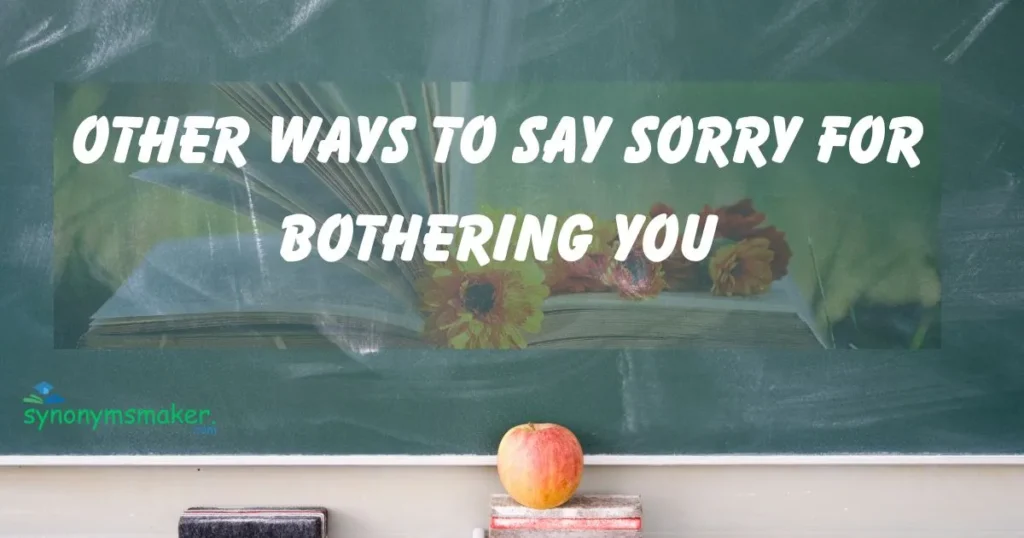Hey there! In today’s professional world, finding the right words to convey your message with consideration and respect is key. Overusing common phrases like “sorry for bothering you” or “sorry to bother you” can dilute your communication, making it sound generic and less impactful.
Choosing fresh alternative phrases not only helps maintain respect for the other person’s time and effort but also makes a real difference in how your request or message is received.
When you want to express warmth, politeness, or simply reach out professionally, there are alternative ways to say these common interruptions in a professional manner. Let’s explore how thoughtful language can enhance communication and cultivate positive interactions in both personal contexts and professional contexts.
Synonyms for Sorry for Bothering You
- Excuse Me for Interrupting
- Hope I’m Not Disturbing You
- Just a Quick Question
- Pardon the Interruption
- Mind If I Jump In?
- I Appreciate Your Time
- Sorry to Intrude
- If You Don’t Mind
- Thank You for Your Patience
- Just a Brief Note
- May I Have a Moment?
- I Don’t Mean to Take Up Much Time
- Allow Me to Briefly Interrupt
- Could I Quickly Check In?
- Thank You for Your Understanding
Excuse Me for Interrupting
In engaging conversations, it’s not uncommon to find oneself needing to interject. Whether to clarify, add a vital point, or redirect attention, knowing how to say “excuse me for interrupting” is essential for maintaining respectful dialogue. Mastering interrupt etiquette helps you effectively navigate moments when you must step in without causing offense.
The key is to pay attention to conversation cues—like when the speaker pauses or signals an opening for input—to know when it’s appropriate to speak. A polite acknowledgment, such as softly saying “excuse me for interrupting,” helps soften the impact of an interjection, showing you are being mindful of the tone and context.
This approach guarantees your interruption is received as constructive rather than disruptive. Ultimately, mastering these skills enriches discussions by fostering an open, engaging exchange of ideas, all while honoring the flow of conversation. Being thoughtful about approaching interruptions transforms moments of pause into opportunities for connection and understanding.
Hope I’m Not Disturbing You
The simple phrase “Hope I’m not disturbing you” plays a crucial role in the domain of communication, especially when reaching out to someone who might be busy or engaged in other tasks. This expression is more than just polite words—it’s about expressing concern and acknowledging the other person’s current engagement. By using this phrase, you show a respectful communication style that prioritizes the listener’s comfort and demonstrates awareness of their time and focus.
When you say, hope I’m not disturbing you, it acts as a graceful entry into a conversation, helping to set a positive tone from the start. This approach is considerate and helps avoid potential distractions, making the other person feel valued and understood. It also respects their personal boundaries, which encourages a more open and genuine interaction.
Using this phrase can create an environment where both parties feel free to engage freely, fostering effective communication and strengthening interpersonal connections. This thoughtful approach naturally encourages dialogue and enhances the overall quality of any conversation. It’s a small, yet powerful way to be considerate and build better relationships.
Just a Quick Question
Many individuals frequently find themselves in situations where they need to ask something quickly without causing a significant disruption. Using the phrase just a quick question is a simple yet effective way to effectively signal this intent. This brief inquiry conveys request for a moment of attention, allowing the speaker to seek necessary information while demonstrating consideration for others’ time.
In professional environments, where time is of the essence, framing communication with just a quick question helps facilitate more open dialogue. It encourages the recipient to engage without feeling overwhelmed or interrupted. This approach fosters a positive communication atmosphere by minimizing perceived inconvenience and promoting engagement.
Ultimately, using this phrase allows for efficient exchanges by providing simple clarification or answers to quick inquiry. It respects others’ time and respects the flow of conversation, making it a valuable tool in both casual and formal interactions. Embracing this expression can help individuals communicate their needs effectively while maintaining professionalism and respect.
Pardon the Interruption
In many situations, when you need to make a brief inquiry or share urgent information, it’s important to avoid disrupting ongoing activities. Employing the phrase pardon the interruption serves as a courteous acknowledgment of the potential inconvenience caused. This simple expression effectively mitigates the impact of unwanted distractions, allowing the speaker to address needs while respecting the listener’s time and focus.
By framing interruption in a polite manner, this phrase fosters a more understanding environment, helping to ease tension and facilitate communication. It strikes a balance between the necessity of engagement and respect for ongoing tasks, showing mindfulness of the context and the recipient’s current commitments. Utilizing the phrase pardon the interruption ensures the interruption remains necessary and unobtrusive, helping conversations flow smoothly without causing frustration or distraction.
In everyday life, being aware of when and how to interrupt respectfully is essential—this phrase acts as a bridge between urgency and courtesy, creating better communication for everyone involved.
Mind If I Jump In?
When you find yourself in a crowded room or an ongoing discussion, engaging in conversations can sometimes feel tricky, especially if you want to assert your voice without causing interruptions or seeming rude. Saying “Mind if I jump in?” is an effective conversation starter—a delicate yet powerful phrase that shows your intention to participate while demonstrating respectful engagement. This approach acknowledges the presence of others and the value of their input, helping you smoothly enter the dialogue.
Using this phrase helps in maneuvering through conversations thoughtfully, maintaining a balance between sharing your thoughts and not undermining those already speaking. It encourages a more inclusive atmosphere, inviting natural flow and open communication, which allows for diverse perspectives to be heard. This small but meaningful step signals your commitment to contribute meaningfully while fostering mutual respect—essential for productive, welcoming conversations in any setting.
I Appreciate Your Time
In today’s fast-paced world, acknowledging time is more important than ever. When you say I appreciate your time to someone, especially a busy individual, you’re not just being polite—you’re expressing appreciation and demonstrating respect for their commitments and priorities. This simple phrase goes beyond words; it conveys a message that you understand the value of their attention and effort.
Using I appreciate your time instead of saying sorry for bothering you creates a positive tone in the conversation. It helps in building rapport and fostering goodwill by showing genuine gratitude. This approach encourages open dialogue and allows both parties to engage meaningfully, making your communication more effective.
Incorporating this phrase naturally in your interactions shows you value others’ time and helps in respecting priorities. This small act of kindness enhances time management and strengthens relationships by recognizing the value of each conversation. By choosing thoughtful phrases like this, you can improve your connections and create a more respectful and understanding environment in every interaction.
Sorry to Intrude
When reaching out to someone, saying sorry to intrude shows that you are aware of their time and space. It’s a polite way of acknowledging that you might be interrupting their current focus or busy schedule. This phrase helps in demonstrating respect before you engage in any conversation.
Using this phrase helps to soften the introduction of your message, especially when you don’t want to seem too demanding. It sets a positive tone and shows that you care about their feelings and priorities. This can make others more open and receptive to your communication.
In a fast-paced world, people appreciate when others recognize the value of their time. Saying sorry to intrude communicates that you don’t take their attention for granted. It also helps to enhance interactions by making the conversation feel more considerate and respectful.
This phrase encourages a more effective communication style because it prepares the listener for a brief interruption. It fosters goodwill and helps you build rapport by respecting their commitments and time management.
If You Don’t Mind
Starting a conversation with if you don’t mind is a thoughtful way to seek permission before proceeding. It shows you’re respecting priorities and willing to wait for the right moment, which is crucial when talking to a busy individual. This phrase creates an atmosphere of understanding and cooperation.
It encourages open dialogue by inviting the other person to share their willingness to engage. Rather than imposing your request, you’re gently asking if it’s a convenient time. This approach fosters positive tone and mutual respect.
Using if you don’t mind conveys a message that you value their attention and are considerate of their schedule. It naturally enhances your ability to engage meaningfully in conversation, making the interaction smoother and more pleasant.
This phrase is essential in maintaining good relationships because it balances assertiveness with politeness. It helps in acknowledging time without seeming intrusive and encourages effective communication between parties.
Thank You for Your Patience
Expressing thank you for your patience is a powerful way to show gratitude when someone has waited or tolerated a delay. It recognizes the other person’s understanding and respect for the time it takes to resolve an issue or complete a task.
This phrase builds goodwill by acknowledging the extra time and effort the other person has invested. It demonstrates your appreciation clearly, fostering a positive tone and encouraging future patience in interactions.
Using thank you for your patience helps to enhance interactions by showing empathy. It conveys that you are aware of how valuable their time is, which is especially important in busy or stressful situations.
This expression strengthens relationships because it respects the other person’s commitments and time management. It reminds them that their attention and understanding are appreciated, creating a respectful communication environment.
Just a Brief Note
Starting with just a brief note signals that your message will be short and to the point. This respects the recipient’s time and signals that you won’t take up much of their attention. It’s an effective way to introduce information quickly in a busy context.
This phrase helps to set a positive tone by showing you’re considerate about how much time the other person can spare. It encourages open dialogue without overwhelming the listener with too much detail upfront.
Using just a brief note also helps to build rapport by being clear about your intentions. It demonstrates that you value the other person’s time management and want to communicate effectively without unnecessary delays.
This approach enhances your ability to engage meaningfully by focusing on the essentials. It respects others’ priorities and fosters goodwill, making it easier for conversations to flow smoothly.
Other ways to say Team Player on Your Resume
May I Have a Moment?
Asking may I have a moment? is a respectful way to request someone’s attention without assuming it’s immediately available. It shows you are mindful of their commitments and time constraints.
This phrase encourages a positive tone and demonstrates respect by giving the other person the chance to decide when they can engage. It helps to avoid interrupting someone who might be busy, promoting more effective communication.
Using may I have a moment? fosters goodwill and builds rapport because it conveys your appreciation for their time before jumping into the conversation. This simple request can make interactions more polite and professional.
By recognizing the value of others’ attention, you create an environment that encourages open dialogue and mutual respect. It’s a great tool for managing conversations in both professional and personal settings.
I Don’t Mean to Take Up Much Time
Saying I don’t mean to take up much time reassures the listener that your message will be brief and considerate of their busy schedule. This phrase helps reduce any pressure or stress they might feel about fitting you in.
It demonstrates respect and awareness of others’ time management skills. By using this phrase, you’re acknowledging time and making it clear that you value their priorities.
This approach creates a positive tone in the conversation, showing empathy for how busy people can be. It encourages more willingness to listen because you’ve addressed a common concern upfront.
Overall, I don’t mean to take up much time helps in building rapport by showing that you care about the other person’s attention and commitments. It’s a great way to engage meaningfully while respecting their schedule.
Allow Me to Briefly Interrupt
Using allow me to briefly interrupt is a polite way to enter a conversation that is already in progress. It signals that you will be quick and respectful of others’ time and focus.
This phrase shows respect for the ongoing discussion and the people involved. It helps maintain a positive tone while acknowledging time constraints, which is essential in any setting.
It fosters goodwill by preparing listeners for your input without seeming rude or impatient. This thoughtful approach makes people more open to your contribution, improving the flow of effective communication.
By using this phrase, you demonstrate an understanding of others’ priorities and help create an environment where everyone feels valued and heard.
Could I Quickly Check In?
Saying could I quickly check in? is a respectful way to ask for a moment of someone’s attention, especially when you need a brief update or confirmation. It shows you’re mindful of their busy schedule.
This phrase encourages open dialogue by signaling that your request will be brief and not disruptive. It helps keep the conversation flowing smoothly without overwhelming the other person.
Using could I quickly check in? conveys your appreciation for their attention and time. It helps build rapport by showing that you value their input while respecting their commitments.
This approach enhances your communication by being clear and polite. It respects others’ time management and encourages more productive and positive interactions.
Thank You for Your Understanding
Expressing thank you for your understanding shows gratitude when the other person has been patient or flexible. It acknowledges their willingness to accommodate challenges or delays.
This phrase builds goodwill and strengthens relationships by recognizing the other person’s commitments and efforts. It creates a positive tone that encourages continued cooperation.
Using thank you for your understanding conveys a message of respect and empathy. It helps others feel valued and appreciated, even during difficult conversations or changes.
Overall, this phrase enhances effective communication by fostering mutual respect and acknowledging the importance of time and attention in any interaction.
Real Life Examples and Scenario
Scenario 1: Reaching Out to a Busy Colleague for Help
You need urgent help from a colleague who is swamped with work, but you don’t want to sound intrusive.
Example:
“I appreciate you taking a moment to help me with this when you have the chance. I understand you have many commitments, so thank you for your attention.”
Scenario 2: Interrupting a Manager During a Meeting
You want to quickly ask your manager a question in the middle of a busy meeting without disrupting the flow.
Example:
“May I briefly check in with you on this point? I don’t want to take up much of your time but need a quick clarification.”
Scenario 3: Contacting a Client After Sending Multiple Emails
You’ve sent several emails to a client and want to politely follow up without sounding bothersome.
Example:
“Thank you for your patience and understanding as I follow up on this. I realize you’re busy, and I truly appreciate your time.”
Scenario 4: Asking a Friend for Advice During Their Busy Day
You want to get advice from a friend who has a packed schedule but want to respect their time.
Example:
“If you don’t mind, could we chat for a few minutes? I promise to keep it brief and value your time greatly.”
Scenario 5: Checking In With a Teacher About Assignment Feedback
You want to ask a teacher about your assignment feedback but don’t want to seem like you’re taking up too much of their time.
Example:
“Just a brief note to see if you had a chance to review my assignment. I appreciate how busy you are and thank you for your attention.”
Conclusion
In every interaction, how we acknowledge someone’s time and attention speaks volumes about our respect and understanding. Choosing thoughtful alternatives to phrases like sorry for bothering you such as I appreciate your time or thank you for your patience helps to create a positive tone and foster goodwill.
These expressions show that we truly value others’ commitments and priorities, encouraging open dialogue and more effective communication. In today’s busy world, being mindful of how we engage with others not only enhances interactions but also builds stronger, more meaningful relationships based on mutual respect and appreciation.

Hi, I’m Adrian Steele, the admin of synonymsmaker.com. I’m passionate about language and dedicated to providing you with the best experience in discovering synonyms and expanding your vocabulary. Feel free to share your ideas or feedback with me. I’m always open to hearing from you!



